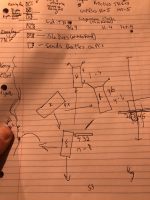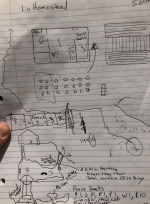@Aldarc Here is the notes I with the boxes I mentioned from last nights session. This would be the element of the game that would tie, in my mind, to referring to the GM's notes. The way I did it though was put this page together in front of the players at the start of the session to help explain to them the situation (I didn't show them the sheet prior to play beginning, but asked for their input as I made it: for instance I showed them an image of the coffins they were in and asked is this "Thin wood" "Thick Wood" or "Reinforced Wood" in your opinion for the purposes of establishing TNs on breaking and Integrity. A lot of times during play if something arises I wasn't expecting (like the player asks to find the toughest martial hero in town or the head of a local group of gamblers, and I haven't made any of that, I sketch out all the info on that character really fast in my notes, including motivations, goals, etc, so I have something tangible to work with in play, that doesn't feel like it is taking shape as the characters interact with it). I don't want to make the mistake of defining what I do in opposition to Pemerton's point about notes. It isn't that notes don't matter, or aren't important (or that setting materials in general aren't important). It is simply the 'playing to discover the GM's notes' label that I find doesn't capture my experience at the table (especially since I am actively working to make sure it isn't simply playing to discover my notes, as that is what prompted me to move towards sandbox in the first place)

This is my (very artistically rendered

sketch of the chasm from the side, just so I could have distances set:
This is my notepad map of the homestead (which I made prior to the campaign starting as I was fleshing out the area). This was an elaboration on existing setting material (I had Li Homestead on the map and a description of it and feast beetle li, but it wasn't until the campaign started and that I mapped out the homestead itself). This wasn't technically a full sandbox because the players came in as a team of constables (so there is a mission based element here). However within that framework, they can do what they want, and if they don't want to be constables (like decide to become bandits or something that is fair by me). Still I would call this more of a sandbox with a concept. In this case they were sent to find a woman who went missing, and eventually they learned that she was abducted by Feast Beetle Li (who was going to kill her in her usual method in s short span of days)
The boxes in this image are just me tracking survival roll results. But the next page had a similar set of boxes to the first in order to track how many days before the victim ended up in the coffin and killed by Feast Beetle Li (they arrived on the final day because they spent three days going after a potential witness and then got lost for a day when they made their way back---so tracking the number of days as a ticking clock was important here)
This is the image I showed them of the coffins:

and just to bring the living NPC thing to focus, even though I mapped out the homestead and the cavern complex, I didn't really see it as a "dungeon" or "location" in need of a exploring. I saw it as a residence. Feast Beetle Li was moving around as she needed (something I might simulate when the players arrive by just randomly rolling to see if she is there or out, which room she is in, what she is doing---i may also simply decide this). As the players interacted with her, it became easier to simply decide what she did and where she went. So as the players tried to get out of the coffins she started adjusting her strategy and taunting them. I decided once they stared using the chains to climb up she simply flipped the switch and had them drop one by one into the chasm. Then she retreated into a position where she could ambush them with a dart trap if they survived and came after her----but she is living so she is only staying there so long before adjusting her strategy. Since the players ending up going down into the cavern and talking with the lady who lives in the cave (Ms. Lan), I decided she is starting to get nervous and concerned and as the session ended, I have this whole week to think about what she might do in the hours the players spent talking with Ms. Lan




